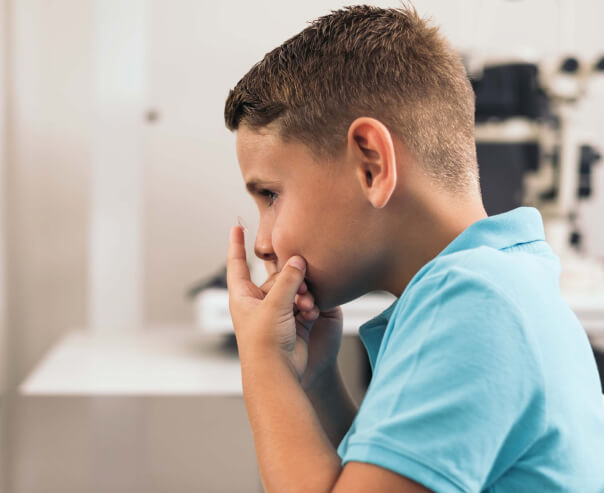Myopia Management in Abilene, Eastland, & Stamford, TX

Myopia (nearsightedness) is increasingly prevalent among children, raising concerns about its impact on their long-term eye health.

The Rising Concern of Myopia in Children

Myopia occurs when the eyeball is too long relative to the focusing power of the cornea and lens, causing light rays to focus at a point in front of the retina rather than directly on its surface. This results in blurred vision when looking at distant objects, while near vision typically remains clear.
As myopia progresses to high myopia, it can pose more significant risks, including an increased likelihood of developing conditions like glaucoma, cataracts, and retinal detachment. Early detection and management are crucial to slow myopia progression and protect future eye health.
Why Glasses Alone Aren’t Enough for Treating Myopia

Glasses are a common solution for correcting nearsightedness by adjusting the focus of light onto the retina, allowing for clearer distant vision. However, while glasses effectively correct the symptoms of myopia, they do not address the condition’s underlying cause.
Glasses do not prevent myopia progression; instead, as the condition worsens, it typically requires stronger and more frequent prescription changes. Myopia keeps progressing, increasing the risk of developing more serious ocular conditions later in life.

Myopia Management for Long-Term Eye Health

Myopia management actively addresses changes in the eye shape to slow the progression of nearsightedness. This approach is fundamental because it aims not only to improve current vision but also to reduce the severity of myopia over a lifetime.
This approach helps children participate more in academics, sports, and social activities without requiring stronger prescription glasses as often. By curbing the progression of myopia, these management techniques significantly decrease the risk of developing severe eye-related diseases later in life.
Tailored Myopia Control for Children

We begin with a detailed initial evaluation to fully understand each patient’s unique visual needs. Our eye doctors discuss your visual history, lifestyle habits, and any familial predisposition to myopia. We then conduct a series of diagnostic tests to assess the current level of myopia and the overall health of your eyes. Based on these findings, our team developed a personalized myopia management strategy.
MySight 1 Day Contact Lenses
MySight 1 Day contact lenses are daily disposable lenses that use a unique optical design known as Dual Focus technology. The central portion of the lens corrects the refractive error, providing clear vision, while concentric peripheral rings extend beyond the corrective zone. These rings create a defocus effect that research has shown to slow the axial elongation of the eyeball. Clinical studies have shown that wearing MySight 1 Day lenses can significantly reduce the pace at which myopia advances in children, making it a preventive strategy and a corrective solution.
Orthokeratology (Ortho-K)
Low-Dose Atropine Eye Drops
Why Choose Our Myopia Management Program

As parents, you naturally want the best for your child’s health and future, and their vision is crucial. Myopia is more than just a vision problem—it can significantly affect a child’s academic performance, self-esteem, and overall quality of life. Our myopia management program at Advanced Eyecare and Vintage Eyewear gives your child the best chance for better vision today and in the future.
Proactive Approach
We don’t just correct myopia; we actively work to slow its progression. By addressing the condition early, we can significantly reduce the risk of high myopia and related eye diseases later in life.
Tailored Solutions
Our personalized program combines thorough diagnostics to understand the specific nature of your child’s myopia and craft treatment plans that cater to their individual needs and lifestyles.
Education and Support
Families become better equipped to make informed decisions about their eye health by understanding myopia and how to manage it through education and support. We provide continuous support and advice, assisting you in confidently navigating the journey of myopia management.